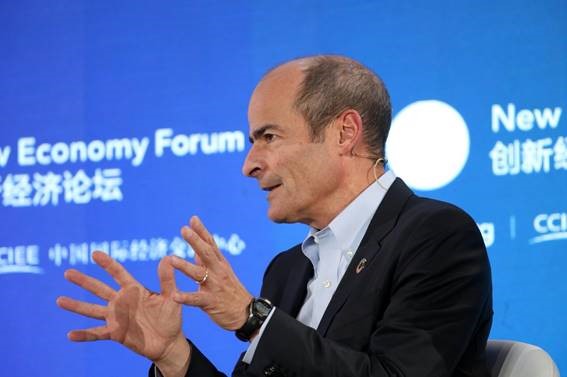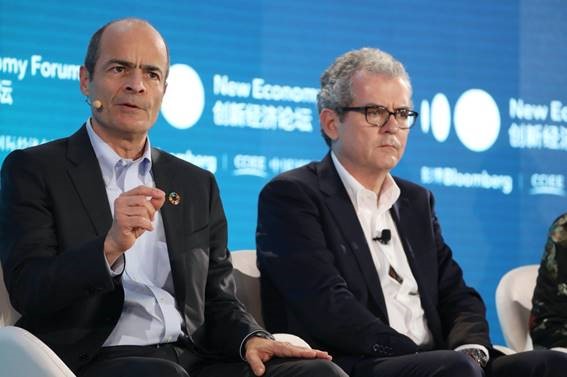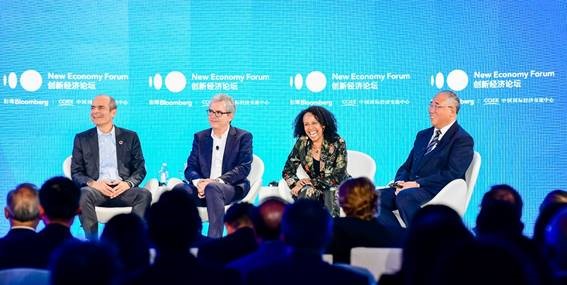 Home NEWS & MEDIA AB InBev Global CEO Carlos Brito speaks at Beijing’s Bloomberg New Economy Forum, calling for greater synergies along whole value chain to address climate change
Home NEWS & MEDIA AB InBev Global CEO Carlos Brito speaks at Beijing’s Bloomberg New Economy Forum, calling for greater synergies along whole value chain to address climate change
November 21st, 2019, Beijing, China – The New Economy Forum (NEF), an invite-only idea hub co-hosted by Bloomberg and the China Center for International Economic Exchanges (CCIEE), successfully kicked off in Beijing, the Chinese capital. Under the theme of ‘a new community for the new economy’, the annual event aimed to propose pragmatic solutions to address prevailing challenges that emerge during the transition to the New Economy. Mr. Carlos Brito, Chief Executive Officer of leading brewer AB InBev, made a well-noted appearance at one of the forum’s panel discussions by proclaiming: “No water, no beer – it’s that simple. So sustainability is our business. It is not like a part nice to have – it is our business.”

No water, no beer – CEO Carlos Brito highlights AB InBev’s reduction commitments and climate actions, iterating “sustainability is our business.”
Bringing together about 500 leading corporate executives, technology innovators, government officials and experts and scholars, the annual celebration of great minds focused on a number of key agendas including global economic governance, trade, science and technology, capital market, climate change, inclusive development and urbanization.
Among the minister-and-executive-level invitees, Carlos Brito spoke at a much-followed main stage panel discussion moderated by Ian Bremmer, Founder and CEO of Eurasia Group and GZERO Media.
There, Brito joined key opinion leaders including Xie Zhenhua, Special Representative for Climate Change Affairs of China and leaders from US big-data firm Gro-Intelligence and Spain’s Inditex for an exceptional debate and exchange of ideas over the topic Climate Change to Climate Action: Saving the World. His highlights shared included AB InBev’s reduction commitments and climate actions: “By 2025, 100% of our purchased electricity around the world will come from renewable sources and we will reduce our carbon emissions by 25% across our entire value chain.”
Echoing UNSDGs and Working across Value Chain to Decarbonize Operations
Turning to renewables : applying renewable electricity to all brewing and vertical operations worldwide;
Being more energy-efficient : continually looking for ways to be more efficient and reduce footprint – such efforts have already been translating into practical progress towards AB InBev’s 2025 goals, as in 2018 alone, reducing emissions from its global operations by as much as 4%;
Applying innovations : investing in new technologies to support the wider supply chain – AB InBev has been supporting, developing and applying innovations in smart agriculture, transportation, refrigeration and supplier technical partnership, in a bid to cut carbon emissions along its value chain.
Brito also reiterated the company’s alignment with the UN Sustainable Development Goals. To achieve such goals, AB InBev has been using its impactful scale to not only to focus on the sustainability of its own business, but also extended to the whole value chain. Tailored to concrete goals, its ongoing sustainability moves mostly cater to three areas:

Brito shares AB InBev’s achievements of renewables electricity: “In two years from 0%, we are already reaching 50% by the end of this year.”
With AB InBev’s climate actions yielding obvious results, Brito noted: “In two years, from 0%, we are already reaching 50% by the end of this year.” According to the CEO, the brewer’s Power Purchase Agreements are shifting more than six terawatt-hours of electricity annually to renewable sources in the markets where it operates, which will help transform the energy industry in several countries. The brewer is looking to have about half of its breweries in China powered by photovoltaic projects by the end of 2020.

AB InBev Global CEO Carlos Brito speaks at Bloomberg New Economy Forum to explore climate change and climate action
“In terms of energy, China enforced its Renewable Energy Law in 2006 and joined the Paris Agreement. So far, China's development in this field is obvious to all.” Said Xie Zhenhua.“By promoting technological advancements and large-scale applications, China has reduced the threshold and cost of renewable energy, so that relevant technologies and experiences can not only serve its own development, but also provide reference for other countries. I think this is a major trend for our future development.”
Beyond renewable electricity, Brito also specifically elaborated on AB InBev’s investments in global smart agriculture: “We take advantage of the 30,000 growers and farmers that we have relationships with for more than 30 years around the world on all continents, and we’re using now more and more technologies and data analytics to predict conditions of micro-climates, soils, and seeds and to try to instruct them in exchanges of best practices. So they know when to harvest, when to plant. So they can really minimize the impact they have on the environment. And we have already 10,000 of the 30,000 connected to the technology, in terms of data sharing.”
Using PPPs to Accelerate Emission Reduction with China Offering Best Practices
Before concluding to a loud round of applause, Brito expressed his hope for how to better advance public-private parentships for greater synergies in the future: “We are a global company. We need to sit down with governments and see how we can try to make this a better place.”
Since first entering the China market, AB InBev has made a combined investment of more than 3 billion US dollars, and more than 30 large-scale breweries. Believing that the private sector has a critical role to play, AB InBev has been actively responding to the Chinese government’s reduction pledges, turning to practical solutions including renewable electricity and green logistics to cut carbon emission. In terms of renewable energies, it is expected that by the end of 2019, nine of AB InBev’s breweries in China will be installed with photovoltaic panels that cover a combined area of 410,000 square meters, equal to the size of 57 standard football pitches – they represent a total installed capacity of 41 megawatts. By that point, around 30% of Budweiser’s annual volume in China will be brewed with renewable electricity. As to green logistics, the brewer has been optimizing its transportation system in China – it has partnered with BYD electric trucks and plans to pilot in Hangzhou and Foshan in 2019.